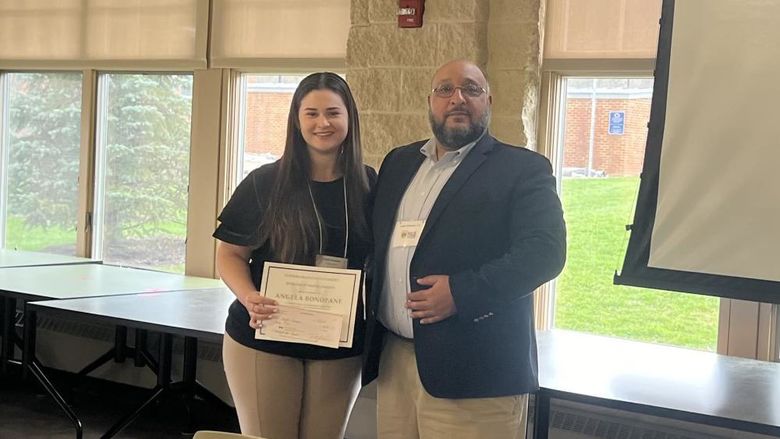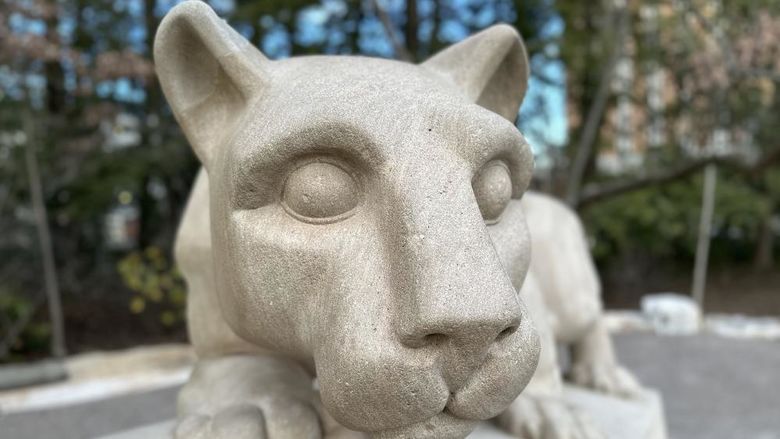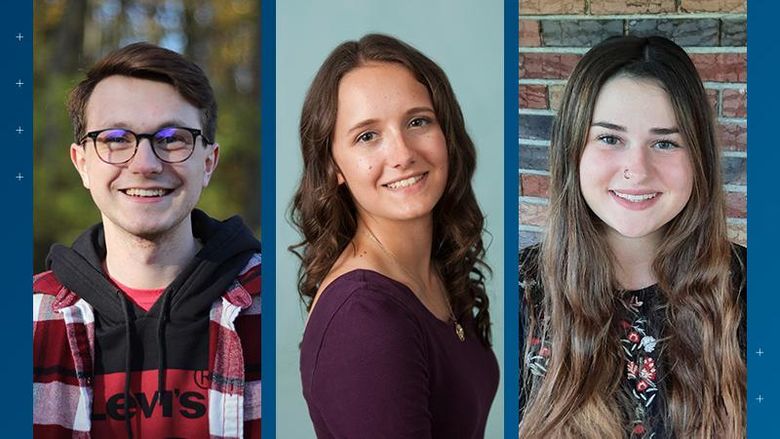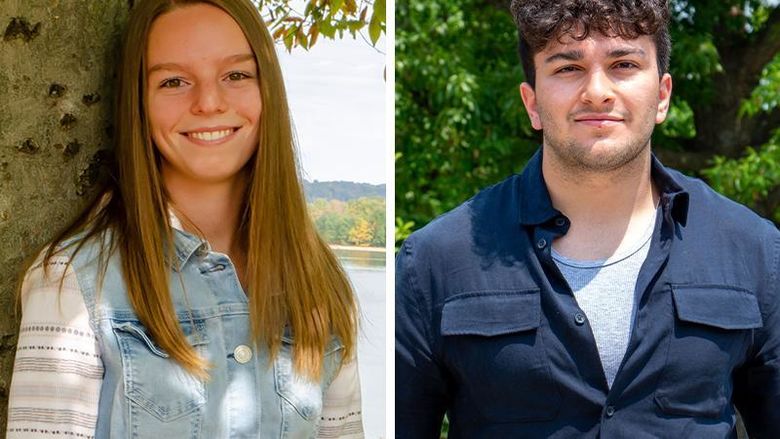
Old Main on Penn State's University Park campus.
UNIVERSITY PARK, Pa. — A total of 64 Erickson Discovery Grants were awarded for summer 2020, allowing for funded student research, scholarship or creative processes.
Each year, students from all academic fields can apply for Erickson Grants to cover project costs (supplies, materials, books, specialized software, travel for the purpose of data collection, etc.) and living expenses to make research possible. The grant can be used for all facets of scholarship and creative process, including conceptualization, proposal writing, identification and implementation of methods and communications of results. All projects are conducted under the supervision of faculty. While the project should be primarily the student’s own work, it can be a part of a larger faculty member’s research.
Because of the COVID-19 pandemic, some student research has been delayed.
“Though our students are contending with difficult circumstances this year, we are still seeing an amazing dedication to research and creative processes,” said Alan Rieck, associate vice president and associate dean of Undergraduate Education.
The program is named in honor of Rodney A. Erickson, the 17th president of Penn State. Applications typically open in October and are due in late January.
Below is a complete list of Erickson Discovery Grant recipients for 2020:
- Dylan Amin, "Analysis of the role of heat-killed Brucella abortus in the development of the splenic microenvironment during stress erythropoiesis," University Park, Immunology and Infectious Diseases, College of Agricultural Sciences
- Brooke Arner, “The Role of Dietary Selenium in the Gut Microbiome of an IBD Infection Model,” University Park, Immunology and Infectious Disease, College of Agricultural Sciences
- Leonardo Batista Capaverde Silva, “Studying the propulsion of particle adsorbed emulsion systems,” University Park, Materials Science and Engineering, College of Earth and Mineral Sciences
- Kyle Batra, “Applying Scaling Laws for Stagnant Lid Convection With Buoyant and Negatively Buoyant Crusts to Determine Exoplanet Habitability,” University Park, Astrophysics, College of Earth and Mineral Sciences
- Nicole Bush, “Co-Amorphous Systems: A way to Improve Drug Solubility,” Fayette, Premedicine, Eberly College of Science
- Jason Cherry, “Soil and Steel: East German Economic Reconstruction,” University Park, History, The Liberal Arts
- Julia Cipparulo, "Elucidating Gene Expression Changes Implicated in Major Depressive Disorder,” University Park, Biochemistry and Molecular Biology, Eberly College of Science
- Owen Courtney, “Exploring a Requirement for Mitochondrial Function in Cancer Cell Motility Through Challenging Physical Environments,” University Park, Biochemistry and Molecular Biology, Eberly College of Science
- Nina De Luna, “Investigating the role of selenium and B cell selenoproteins in humoral immunity,” University Park, Immunology and Infectious Disease, College of Agricultural Sciences
- Julia Edelmann, "Art History as a Resource for Art Curriculum in K-6 Art Programs,” University Park, Art Education, Fine Arts (Drawing and Painting), College of Arts and Architecture
- Emily Eiss, “Status of the methylome in Solanum tuberosum tubers treated with sprout inhibitor 1,4-dimethylnaphthalene,” Penn State Behrend, Biology (focus in Cell and Molecular Biology and Biochemistry)
- Elinor Farber, “Algerian Jewish Migration to France Archival Research,” University Park, History, Economics, and French, The College of the Liberal Arts
- Danny Glickman, “Control of Gold Nanoparticle Synthesis in Polydimethylsiloxane,” University Park, Chemistry, Eberly College of Science
- Nina Gold, “Two Cultures, One Cabaret: Understanding the Influence of Traditional French Cabaret on Modern American Cabaret,” University Park, Acting, College of Arts and Architecture
- Erica Hanes, “Transmission of Trauma: Cultural Values of Holocaust Survivor Offspring,” DuBois, Human Development and Family Studies, Health and Human Development
- Ruochuan Huang, “RNA folding under in vivo-like condition,” University Park, Physics Eberly College of Science
- Christopher Hudson, “Effect of heme on redox-regulated Eag1 K+ channels at the voltage sensor/pore,” University Park, Biology, Eberly College of Science
- Austin Huynh, “Development of CRISPR technology to study the genetics of circadian rhythms in the common house spider, Parasteatoda tepidariorum,” York, Genetic Development Biology
- Chyvonne Jessick, “Assessing the Impact of Bird Strike Frequency on The Pennsylvania State University Campus,” University Park, Environmental Resource Management, College of Agricultural Sciences
- Lydia Jordache, “Investigating the Roles of 2',3'-cNMPs in Prokaryotic Stress Response,” University Park, Microbiology, Eberly College of Science
- David Kennedy, “Antibiotic Removal by Modified Hairy Nanocellulose,” University Park, Chemical Engineering, Chemistry, College of Engineering
- Zineb Kobi, “Thank you study,” World Campus, Psychology
- Timothy Kuklis, “Green Thumb on A Red Planet,” Lehigh Valley, Geosciences
- Gannon Lenhart, “Exploring Monopole Interactions,” Fayette, Aerospace Engineering, College of Engineering
- Xianqing Li, “Effect of Strain and Surface Energy on the Phase Formation of 2D Electronic Materials,” University Park, Materials Science and Engineering, College of Earth and Mineral Sciences
- Annie Liu, “Aural Distractions in Musical Performance: A Quantitative Exploration of Attention and Behavior,” University Park, Musical Arts, College of Arts and Architecture
- Anthony Mannarino, “Osgood-Schlatter Disease as a Model for Studying Structure-Function Relationships in the Knee Joint Extensor Mechanism,” University Park, Mechanical Engineering, College of Engineering
- Eli Mertick Sykes, “Degradation of Protein Aggregates via Small Molecule Activation of Autophagy,” University Park, Biochemistry and Molecular Biology, Eberly College of Science
- Kennedy Miller, “Characterization of Lanmodulin Homologs as Lanthanide-Binding Proteins,” University Park, Chemistry, Eberly College of Science
- Brock Molloy, “Using honey bee collected pollen as an early indicator for viral plant diseases impacting crops in Pennsylvania,” University Park, Biology, Eberly College of Science
- Joseph Molnar, “Combustor Flow Field Characterization with Acoustic Forcing, Swirl Fluctuation, and Centerbody Inclusion for Flow Structure Control in Gas Turbine Systems,” University Park, Mechanical Engineering, College of Engineering
- Vitaliy Mykhnyak, “Investigation of gamma ray radiation on WSE2,” Abington, Nuclear Engineering
- Cassandra Nunez, “Studying the Effect of Environmental Stressors on Bacterial Motion using Time-resolved Monitoring of Optical Scattering,” University Park, Electrical Engineering, College of Engineering
- Laurena Olsson, “The Effects of Natural RNA Modifications on G-Quadruplex Formation,” University Park, Immunology and Infectious Disease, Chemistry, Eberly College of Science
- Emma Orloski, “Magic Mirror on the Wall: Gratitude Alters Self-Image and Aids Cognitive Behavioral Therapy,” University Park, Psychology, The College of the Liberal Arts
- Ann Marie Paterno, “Nano-Mesh Materials Produced through Anodized Impure Aluminum,” University Park, Chemistry, Eberly College of Science
- Serenah Pauliuc, “Characterization of the Durability of Bio-Based Composites for Construction Applications,” Berks, Mechanical Engineering
- Jenna Phillips, “Sensor Placement for Monitoring Both Equine and Rider Activity,” Berks, Kinesiology
- Taylor Pust, “Investigation of Adhesion Characteristics on Lodged Thromboemboli and Cerebral Arteries,” University Park, Biology and Psychology, Eberly College of Science
- Joseph Razon, “Investigation of Defect Chemistry in 2D Materials,” Abington, Chemical Engineering
- Josie Rice, “Characterization of the role of the long non-coding RNA MEG3 in the autophagy of human glomerular epithelial cells following injury induced by high glucose,” Harrisburg, General Biology
- Lauren Rickert, “How Isabella d’Este’s collection reflects women’s patronage during the Renaissance,” University Park, Art History, Arts and Architecture
- Oliver Rose, “The Victorian Red Pill: A Genealogy of the Neoreactionary Movement and its Ideology,” University Park, Philosophy, Mathematics, The College of the Liberal Arts
- Serena Schade, “Effects of Online Social Network on College Students’ Attitudes towards Physical Activity Berks,” Berks, Life Science
- Matthew Schubach, “Synthesis of Catalytically-Active Organic Nanoparticles,” University Park, Chemistry, Eberly College of Science
- Maria Schultheis, “The Future of Photovoltaics: Using Amino Acid Chains as Molecular Electronics,” University Park, Animal Science, College of Agricultural Sciences
- Jay Sim, “Reinventing Foundry in a Box for the 21st Century,” University Park, Mechanical Engineering, College of Engineering
- Harman Singh, “Examining the Relationship between Flooding and Land Use Land Cover in Kochi through a Mixed Method Approach,” University Park, Geography , College of Earth and Mineral Sciences
- Taylor Slusser, “The Role of Eternity in Scriptural Interpretation within the Epistle to the Hebrews,” University Park, Classics and Ancient Mediterranean Studies, Environmental Resource Management, The College of the Liberal Arts
- Courtney Smith, “Using Social Media to Perform Parasocial Relationships with Celebrities,” University Park, Security and Risk Analysis and Public Relations, College of Information Sciences and Technology
- Kelly Snyder, “Examining the Effect of a Growth Mindset on Personality Faking,” University Park, Nursing, College of Nursing
- Josephine Soddano, “Investigating the Effect of Race on Courtroom Dynamics,” University Park, Mathematics, Eberly College of Science
- Shivani Sowmyan, “Analysis of Structural Brain Imaging Data in Pediatric Samples – The Impact of Using Adult vs Pediatric Templates in Data Processing,” University Park, Biobehavioral Health, College of Health and Human Development
- Thomas Starr, “Characterizing the Single Molecule Dynamics of Cellulases in the Presence of Multiple Cellulose Degrading Enzymes,” University Park, Biochemistry and Molecular Biology, Eberly College of Science
- Carolyn Telfer, “Proposed Mechanism for Conversion of 4-chloro-lysine into 4-chloro-allyl-lysine via BesC,” University Park, Biochemistry and Molecular Biology, Eberly College of Science
- Bruce Tirrell, “The Effect of Gender Diversity and Geographic Dispersion on Continued Interdisciplinary Collaboration in NSF-Funded Teams,” University Park, Labor and Human Resources, The College of the Liberal Arts
- Alexander Trevelino, “Economic Efficiency of Different Lighting Systems in Hydroponic Production of Lettuce,” University Park, Biological Engineering, College of Agricultural Sciences
- Cristina Valentina Craescu, “Catalysis-Induced Mobility of Enzyme-Bound Lipid Bilayers,” University Park, Chemistry, Eberly College of Science
- Makarand Wadagave, “Studying Oxidation of WSe2 in ambient conditions via Raman Spectroscopy, Photoluminescence imaging, and Scanning electron microscopy,” University Park, Materials Science And Engineering, College of Earth and Mineral Sciences
- Yuang Wang, “Investigating the photocatalytic properties of ZnSe Mn2+ nanoparticles,” University Park, Chemistry, Eberly College of Science
- Thomas Weidman, “The role of PKA in regulating CPT1 splicing in the Drosophila fat body,” Berks, Biology: Development and Genetics
- Colin Williams, “Nonlinear ultrasonics for characterization of fracture toughness in steel alloys,” University Park, Engineering Science, College of Engineering
- Huntur Woodard, “Identification of Molecular Markers for Western Fence Lizard (Sceloporus occidentalis) and the Effects of Wild Fire on Western Fence Lizard Genetic Diversity,” York, Biology
- Keaton Wright, “Determination of Trajectories of Magnetic Monopoles,” Fayette, Physics
The Research Opportunities for Undergraduates program is part of Penn State Undergraduate Education, the academic administrative unit that provides leadership and coordination for University-wide programs and initiatives in support of undergraduate teaching and learning at Penn State. Learn more about Undergraduate Education at undergrad.psu.edu.





